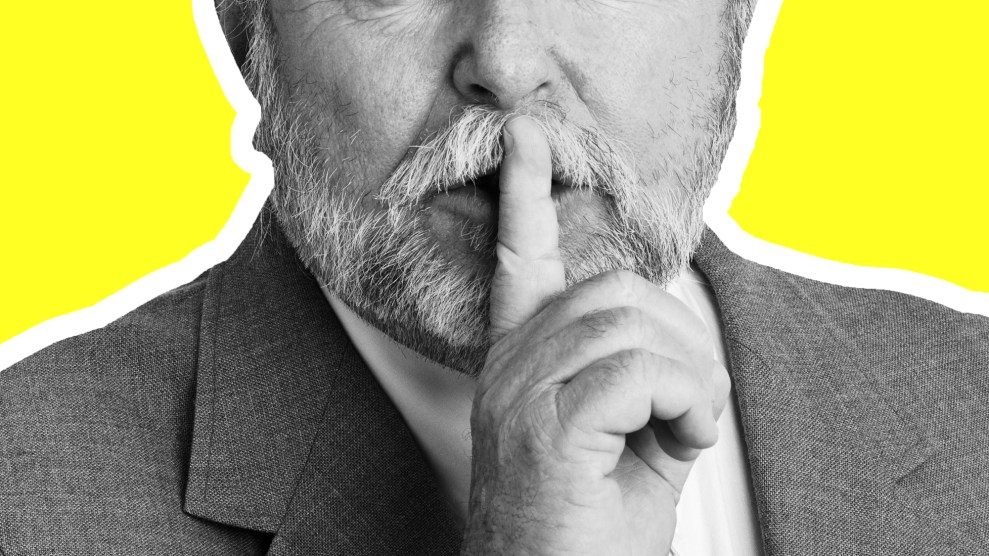
Dan Breckwoldt/iStock (photoillustration by Mother Jones)
Harvey Weinstein’s demotion from kingmaker to pariah came with lightning speed in the wake of New York Times and New Yorker exposés detailing alleged sexual harassment and sexual assault claims against him going back decades. These revelations, and the who’s-who of actresses who have since stepped forward to share their bad experiences with Weinstein and others under the #MeToo hashtag, raise pointed questions about how Hollywood’s legal-and-PR apparatus could have protected him for so long. (Weinstein has denied “any allegations of non-consensual sex”—chalking up any misbehavior to the permissive culture of the 1960s and ’70s.)
The entertainment world, of course, is no stranger to sexual misconduct scandals involving well-connected men (Roman Polanski, Woody Allen, Casey Affleck, etc.) who continue to make movies and remain members in good standing of the Academy of Motion Picture Arts and Sciences—with the exception of Allen, who was never a member. But Weinstein’s firing by his own company and expulsion from the Academy and other professional groups beg the question of whether the media and entertainment industries will continue to coddle rich and talented men who are unwilling to control their animal impulses.
Allen, who in the early 1990s was investigated based on allegations that he had sexually abused his seven-year-old daughter—no charges were filed, and Allen vehemently denied the abuse—recently spoke with the BBC about the Weinstein scandal. He warned against creating a “witch hunt atmosphere” in which “every guy in an office who winks at a woman is suddenly having to call a lawyer to defend himself.”
But nobody is talking about light flirtation. Here are details from the stories of five powerful men facing claims of serial sexual misconduct ranging from unwanted advances and inappropriate touching to actual rape.
Roger Ailes
History: Claims of sexual harassment against the former chairman of Fox News, who died in May, extend back more than four decades. Multiple examples were detailed in Gabriel Sherman’s 2014 biography of Ailes, The Loudest Voice in the Room; one woman claimed Ailes had offered her $100 a week during the 1980s in exchange for sex whenever he desired it. Fox News employees had heard the rumors, but feared speaking out against their boss, who some workers suspected of surreptitiously monitoring their phone and email communications.
Tipping Point: In July 2016, former Fox News host Gretchen Carlson filed a lawsuit claiming the network fired her because she had refused Ailes’ advances. “I think you and I should have had a sexual relationship a long time ago and then you’d be good and better and I’d be good and better,” Ailes told Carlson, according to the lawsuit. Carlson’s lawsuit prompted more than two dozen other women, including Megyn Kelly, to come forward saying they, too, had been sexually harassed by Ailes. Amid the controversy, presidential candidate Donald Trump, also the subject of numerous allegations of sexual harassment over the years (see below), defended Ailes as a “very, very good person.”
Aftermath: Ailes resigned two weeks after Carlson filed her suit, ending his 20-year reign at the company he founded. In May, he suffered a fall at home, hit his head, and died of a subdural hematoma.
Bill Cosby
History: Allegations of sexual assault, including rape, against the once-beloved comedian and actor date back to the 1960s. Many of Cosby’s accusers—who number in the dozens—have claimed the comedian drugged them before attacking them. In March 2005, former Temple University administrator Andrea Constand filed civil charges against Cosby, claiming he had drugged and groped her at his Pennsylvania home the year before. “One night around this time last year I was invited to Mr. Cosby’s house and he gave me pills and he sexually violated me without me consenting,” said Constand, recalling what she’d told her mother at the time. Thirteen women agreed to act as supporting witnesses to establish a pattern of similar behavior by Cosby. The lawsuit was settled out of court in 2006, but it would come back to haunt Cosby, who also has been accused of offering money in exchange for his accusers’ silence.
Tipping Point: The Cosby controversy was revived in 2014, after a clip of stand-up comedian Hannibal Buress calling Cosby a rapist went viral. For a cover story several months later, New York magazine interviewed 35 women who claimed Cosby had sexually assaulted them. The same month, a judge unsealed a deposition from the Constand lawsuit in which Cosby admits he used quaaludes to drug women he wanted to have sex with:
Lawyer: You gave them to other people?
Cosby: Yes.
[…]
Lawyer: When you got the Quaaludes, was it in your mind that you were going to use these Quaaludes for young women that you wanted to have sex with?
Cosby: Yes.
Lawyer: Did you ever give any of those young women the Quaaludes without their knowledge?
Cosby’s lawyer interjected before he could answer.
To date, more than 50 women have publicly accused Cosby of sexual misconduct. Cosby has repeatedly denied any wrongdoing.
https://www.youtube.com/watch?v=dzB8dTVALQI
Aftermath: In December 2015, armed with new evidence in Constand’s case, prosecutors charged Cosby with three counts of aggravated indecent sexual assault. It was the first time he had been formally charged, despite decades of allegations. In June 2017, a mistrial was declared because the jury could not reach a unanimous verdict—10 out of 12 jurors reportedly believed Cosby was guilty. His prosecutors said they planned to retry the case. “The current propaganda that I am going to conduct a sexual assault tour is false,” Cosby told ABC. “Any further information about public plans will be given at the appropriate time.”
Bill O’Reilly
History: In 2004, Andrea Mackris sued O’Reilly, her immediate supervisor at Fox News, claiming he had subjected her to repeated sexual harassment and unwanted advances, including unwanted phone sex. The Smoking Gun published a copy of the lawsuit, which among other things claimed O’Reilly once urged Mackris to “put a falafel thing” on her “pussy”—he may have been referring to a shower loofah. Hours before Mackris filed her suit, O’Reilly sued Mackris for attempted extortion, but he did not specifically deny her allegations. In January 2017, Law Newz revealed that Fox had settled a similar lawsuit from Juliet Huddy, a former host for a Fox News affiliate.
Tipping Point: In an April 2017 exposé, the New York Times disclosed additional lawsuits against O’Reilly. He or Fox News, the Times reported, had reached secret settlements totaling roughly $13 million with five women who had accused him of sexual harassment. The largest award, the investigation revealed, was $9 million, paid to Mackris. The Times story put immense pressure on parent company 21st Century Fox to get rid of O’Reilly, the top-rated host in cable news at the time. O’Reilly has denied the allegations, calling them a “political and financial hit job.”
Aftermath: Ratings for “The O’Reilly Factor” actually improved as a result of the scandal, but O’Reilly was fired 18 days after the Times article appeared. In September, he returned to Fox for the first time since his ouster to appear as a guest on Sean Hannity’s show. “Come back, will you come back?” Hannity implored him.
https://www.youtube.com/watch?v=bNDI1f1BMRw
Donald Trump
History: Our 45th president has been dogged by sexual assault allegations and related legal complaints since the 1980s, when Trump rose to prominence as a headline-grabbing New York City developer. Journalist Harry Hurt III obtained a divorce deposition from Trump’s former wife, Ivana Trump, in which she accused him of once raping her—although she later claimed she never meant it in the “criminal sense.” Trump denied the rape allegation. In 1997, Jill Harth filed a lawsuit alleging Trump had groped her on two separate occasions: once at a 1992 dinner with her and her then-boyfriend, George Houraney, and again during a visit to Mar-a-Lago. The lawsuit was withdrawn after Trump settled a separate business lawsuit with Houraney for an undisclosed sum.
Tipping Point: The October 2016 release of a recording from 2005, in which Trump bragged to Access Hollywood host Billy Bush of his escapades, opened the floodgates of sexual misconduct allegations against the candidate. “I just start kissing them,” Trump told Bush. “It’s like a magnet. Just kiss. I don’t even wait—and when you’re a star they let you do it. You can do anything. Grab them by the pussy.” A string of women came forward with accounts of Trump groping them under tables, forcibly kissing them on the mouth, and so on. To date, at least 17 women have accused him of inappropriate sexual behavior—Trump has responded by calling the allegations “fake news” and threatened to sue his accusers after the election. He dismissed the damning hot-mic Access Hollywood tape as “just words.”
Aftermath: Trump was elected president one month after the Washington Post released the Access Hollywood tape. He has yet to sue his accusers.
Harvey Weinstein
History: Weinstein’s alleged serial sexual harassment was among Hollywood’s worst-kept secrets, with rampant rumors and jokes circulating in the industry since the 1980s. The rumors typically featured young actresses being summoned to the producer’s hotel room, where he would grope them or ask for massages. In a 2005 video clip now making the rounds, rockstar and actress Courtney Love was asked at an event if she had advice for a young girl moving to Hollywood. She responded: “Umm, I’ll get libeled if I say it…If Harvey Weinstein invites you to a private party in the Four Seasons, don’t go.” (Love later said she was “eternally banned” from the Creative Arts Agency for the remark. In 2013, presenter Seth MacFarlane openly joked about Weinstein’s conduct while announcing the Oscar nominees for Best Supporting Actress: “Congratulations, you five ladies no longer have to pretend to be attracted to Harvey Weinstein.”
Tipping Point: In October 2017, the New York Times reported that Weinstein had reached at least eight previously undisclosed settlements with women accusing the Hollywood executive of sexual misconduct or harassment. Days later, Ronan Farrow, reporting for the New Yorker, detailed accounts from additional women, including three who claimed Weinstein raped them. (“Any allegations of non-consensual sex are unequivocally denied by Mr. Weinstein,” his spokesman responded.) Over the years, Weinstein has effectively kept misconduct claims out of the headlines by buying off journalists or threatening to sue media outlets. His ability to make or break careers kept actresses quiet. Farrow also wrote about a 2015 NYPD sting in which model Ambra Battilana Gutierrez wore a wire to record evidence of Weinstein’s aggresive advances. In the recording, he appears to admit having groped her the day before.
Aftermath: Weinstein was fired from the Weinstein Company three days after the Times investigation hit—in spite of a reported contract clause that said he couldn’t be fired for treating someone “improperly” so long as he paid for any monetary settlements or fines that might result. Weinstein’s downfall encouraged more women, including high-profile actresses such as Cara Delevingne, Angelina Jolie, and Gwyneth Paltrow to talk about their own bad experiences with Weinstein. As the allegations mounted, MacFarlane released a statement explaining his Oscars joke:
— Seth MacFarlane (@SethMacFarlane) October 11, 2017
The NYPD and London’s Metropolitan Police Department are investigating two assault allegations against Weinstein to determine whether crimes were committed—one from 2004 and another from the 1980s. Weinstein, whose company’s films have won dozens of Oscars, was formally expelled from the Academy last week.









